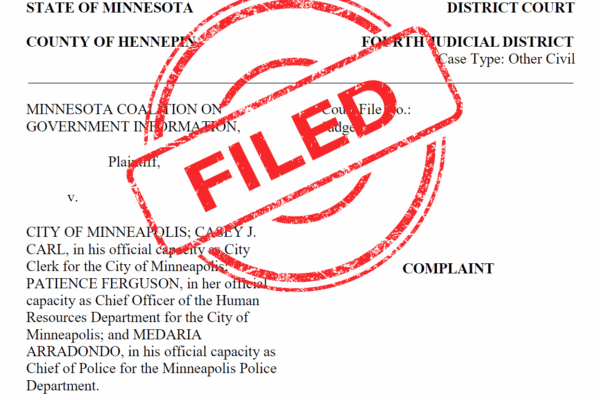Today, the Minnesota Coalition on Government Information (MNCOGI) requested partial summary judgment in its lawsuit called MNCOGI v City of Minneapolis et al.
MNCOGI, represented by the ACLU of Minnesota and Ballard Spahr, is asking the judge to rule that MPD must publicly release unredacted copies of disciplinary actions hidden under the “coaching” label.
In June 2o21, the ACLU-MN and Ballard Spahr filed the lawsuit on behalf of MNCOGI. The suit alleges that the city of Minneapolis and the Minneapolis Police Department (MPD) willfully subverted the Minnesota Government Data Practices Act (MGDPA) by withholding public data about disciplinary action taken against police for serious misconduct by calling it “coaching” instead of discipline. Although many personnel records are private data under the MGDPA, it makes public the “final disposition of disciplinary action.”
The case started in February 2021 when MNCOGI sought records related to the use of “coaching” by MPD, and the city categorically denied access to these records.
“MNCOGI has only ever asked for the city of Minneapolis to follow the laws of this state and its own policies,” said Ballard Spahr Attorney Isabella Salomão Nascimento. “Were it to do just those two things, the public would have the insight it deserves into the types of police misconduct that are harmful to us all.”
Since George Floyd’s murder, City officials have repeatedly claimed MPD uses coaching (an oral process involving a talk with a supervisor) only to quickly address low-level or “A” level police misconduct, such as seatbelt violations. MPD stated that “[c]oaching is not a discipline and has never been discipline.”
But multiple records show that, since at least 2015, MPD has been coaching misconduct at the “B” level and above, including for constitutional violations. This sort of coaching occurs after a full administrative investigation in which officers are awarded the same due process they would receive before facing disciplinary action. The process takes months or even years. The coaching decision is issued by the Chief of Police, and multiple officers have grieved such coaching as a form of discipline.
“We’re not telling the City it has to stop coaching officers,” said Ballard Spahr Partner Leita Walker, referring to the just-in-time, gentle, and often undocumented corrections used for low-level misconduct. “What we are saying, is that if it looks like discipline and quacks like discipline — and if it’s for serious misconduct – then it’s discipline and it’s public."
Important to know from the statement of facts:
- The City admits the police chief has complete discretion to coach murder if they want to without imposing any other consequence, and in fact serious misconduct has been addressed solely through coaching.
- Contrary to the City's claim that coaching is never disciplinary, City records repeatedly reveal instances where so-called coaching and the process leading up to it is indistinguishable from recognized forms of discipline – which opens it to public scrutiny.
- Despite its claims that coaching isn’t used for serious misconduct, MPD has coached officers who violated use of force policies or failed to report improper use of force; officers who mishandled department firearms (including an officer who fired into the wall of the First Precinct); officers who searched a vehicle without legal authority; and officers who dangerously pursued a driver they could apprehend later, among other examples.
- MPD summarily closed MNCOGI’s MGDPA request within minutes and without making any effort to identify, collect, or review responsive data.
“The City of Minneapolis seems to struggle with the truth. George Floyd did not die from a ‘medical incident,’” said ACLU-MN Legal Director Teresa Nelson. “And despite what City leaders told the press and public a year after his murder, MPD doesn’t just coach low-level misconduct, it also coaches more serious misconduct, effectively sweeping it under the rug. Without transparency, it is impossible for the public to ensure police follow the Constitution or hold police accountable when they do not.”
The ACLU of Minnesota is a nonprofit, nonpartisan organization that protects and promotes the civil liberties and civil rights of all Minnesotans through litigation, legislative advocacy and community engagement. Learn more at ACLU-MN.org.
Ballard Spahr LLP is a law firm with more than 600 lawyers in 15 U.S. offices. Lawyers in its Media and Entertainment Law Group help clients across platforms navigate some of the most challenging legal issues that arise in a healthy, functioning democracy—supporting government transparency, newsgathering, and free expression by journalists and advocacy groups across the country.
MNCOGI is a nonprofit, nonpartisan organization that works for government accountability through transparency and provides public education on government information policy and related issues. Learn more at MNCOGI.ORG.
Stay Informed
Sign up to be the first to hear about how to take action.
By completing this form, I agree to receive occasional emails per the terms of the ACLU’s privacy statement.
By completing this form, I agree to receive occasional emails per the terms of the ACLU’s privacy statement.

